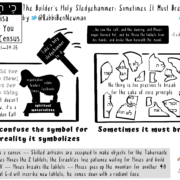Graceful Emulation / Graceful Masculinity – Beshallah

Part of a periodic Torah series on graceful masculinity and Jewish values.
As their Egyptian oppressors are swallowed up by the sea, Israel bursts into exultant song. It is a song of victory, a celebration of freedom and human dignity. The Israelites had been enslaved for hundreds of years, Moshe and Aaron had been fighting with Pharaoh for many months, and now finally the battle was over.
The problem is that even after crossing the sea, the Israelites are still in the desert. Vanquishing our foes does not automatically lead to achieving our goals. Israel needs to move forward to Sinai to receive the Torah and forward further to the promised land, to create their ideal society.
Midrash Tanchuma explains that Moshe had to push Israel to move past the sea. The people wanted to stay where they were, relishing their triumph and collecting the Egyptian baubles they found floating in the water. We can get stuck in a moment of success and forget that the real work has not yet even begun. The Song of the Sea contains advice for how to remember to orient towards our goals.
עָזִּי וְזִמְרָת יָ-הּ, וַיְהִי-לִי לִישׁוּעָה; זֶה אֵ-לִי וְאַנְוֵהוּ, אֱלֹקי אָבִי וַאֲרֹמְמֶנְהוּ.
G-d’s strength and power have been my salvation. This is my G-d וְאַנְוֵהוּ; the G-d of my father and I will exalt G-d. (Exodus 15:2)
The word וְאַנְוֵהוּ is interpreted in multiple ways. Talmud Bavli Shabbat 133b explains:
אַבָּא שָׁאוּל אוֹמֵר: ״וְאַנְוֵהוּ״ — הֱוֵי דּוֹמֶה לוֹ, מָה הוּא חַנּוּן וְרַחוּם — אַף אַתָּה הֱיֵה חַנּוּן וְרַחוּם
Abba Shaul teaches: “וְאַנְוֵהוּ” means we must strive to be like God – just as God is gracious and merciful, we too must be gracious and merciful.
Rashi adds:
הוי דומה לו – ולשון “אנוהו” אני והוא אעשה עצמי כמותו לדבק בדרכיו
be like God the word ״וְאַנְוֵהוּ״ is an anagram of אני והוא, I and God. I will make myself like God and do as God does.
The mandate to continually strive to be more like G-d is the antidote for getting complacent in our current victory. The verse, and the moment, model the shift from being oppressed, and in the opposition, to channeling the freedom and momentum forward.
There is a power and energy in fighting for freedom. As long as we are in the opposition we have a clear goal, but it can be harder to maintain our drive once we are empowered to actually make things better. For human beings it is difficult to hold focus, but when we strive to be like G-d, we are always working towards a more perfect existence.
Talmud Bavli Sotah 11b teaches that when Pharaoh decreed that all baby boys be killed, the pregnant Israelite women would slip out to the fields to give birth in secret and then leave the babies there. In a lovely description of Divine nurturing, God cares for the babies and provides food and sustenance. When the children grow older they return home to their parents but they always remember their early encounters with the all-protecting Deity. At the Splitting of the Sea, these children are the first to recognize God, familiar as they are with God’s providence. They declare זֶה אֵ-לִי וְאַנְוֵה, “This is my G-d and I want to be like God”, providing protection and sustenance to others.
This is the essence of graceful emulation. We must strive to be like God, using our talents and energy to help others. The little boys who are cared for by God grow up to be men who perceive God and try to be like God in caring for others. This role is observed by the mystical work, Sefer Yetzirah, that teaches grace חן is governed by the letter ת, which (added to חן) forms the word חתן groom. Pirkei D’Rabbi Eliezer compares a groom to a king in that they are the center of attention and have the power to influence all those around them. The letter ת has a numerical value of 400 and relates to the 400 years of enslavement, in which the Israelites’ souls, as well as their bodies, were shackled. At the splitting of the sea, the people found a physical and a spiritual liberation.
The word וְאַנְוֵהוּ can also be related to the Hebrew word נוי, or beauty. Talmud Bavli Shabbat 133b explains that זֶה אֵ-לִי וְאַנְוֵהוּ is accomplished by performing God’s commandments in a beautiful way. We should not just acquire any shofar or lulav. Rather, we should be sure to get a beautiful one, and in so doing we beautify our relationship with God. Rav Gedalia Finkel in his work Imrei Gedalia teaches that an aspect of beautification is making sure that we protect and prevent our actions from falling below an acceptable threshold. This posture requires us to focus on advancing the good and not losing the hard earned progress.
Even when we are united in purpose, we can still be waylaid by disagreements over implementation. Talmud Bavli Sotah 36b describes this scene right before the sea splits:
דתניא, היה ר”מ אומר: כשעמדו ישראל על הים, היו שבטים מנצחים זה עם זה, זה אומר אני יורד תחלה לים וזה אומר אני יורד תחלה לים, קפץ שבטו של בנימין וירד לים תחילה, . . . והיו שרי יהודה רוגמים אותם
It was taught: R. Meir said: When the Israelites stood by the Sea of Reeds, the tribes were fighting with one another. One said, “I will go down first!” The other said, “I will go down first.” The tribe of Benjamin jumped and descended into the sea first. . . .and the officers of the tribe of Yehuda threw stones at them.
All of the tribes of Israel recognize that they need to cross through the sea. When the tribe of Benjamin jumps forward though, to actually do it, the tribe of Judah does not commend them. Instead they throw stones at them. If we want to work together to accomplish our goals, we must keep those goals in mind and not be distracted by arguments over who does what first.
This is not to say that the identity of change leaders is irrelevant. Real progress is often determined by who takes charge. Historically, men have been on the forefront of social movements because they have had the resources and social standing to make themselves heard. The beautification of today’s organizing is achieved through diverse representation and a deep unification of the collective, ensuring the soul’s ascendancy over the subjugation of gender inequality.


By R. Wendy Amsellem and R. Mike Mike Moskowitz.









